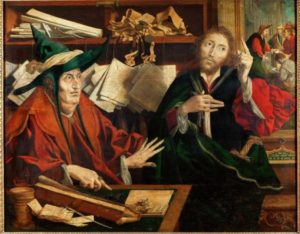Illuminations on the Lectionary readings for Sept. 21, 2025 (Pentecost 15C/Proper 20)

Parable of the Unjust Steward (c.1540), oil painting by Marinus van Reymerswaele (c.1490-c.1546). Kunsthistorisches Museum, Vienna. (Click image to enlarge.)
First Reading (Track One): Jeremiah 8:18-9:1
“You cannot serve God and wealth.” Jesus speaks so often and so consistently about the dangers of riches and our obligation to support the poor that we really need to take this message seriously. This call to use our wealth to care for the poor, widows, orphans, and immigrants is deeply rooted in the Torah, the Law of Judaism that Jesus knew and taught. We hear this call in Sunday’s Track One first reading, as Jeremiah grieves with profound emotion over the people’s failure of righteousness and justice. They hoard riches and ignore the poor. The prophet mourns deeply, imagining God’s own mourning: “Is there no balm in Gilead?”
First Reading (Track Two): Amos 8:4-7
If the ancient prophets in the Hebrew Bible often sound angry, it is likely because they have to keep shouting the same message to the same people over and over again. In Sunday’s Track Two first reading, the Prophet Amos echoes this stern prophetic chorus: The people languish in exile, their city in ruins, and the temple destroyed. When we fail to take care of the poor and the needy, when we lie, cheat, and steal, and act as if we did nothing wrong, God grows angry, Jeremiah shouts. For such acts and omissions, there are consequences!
Psalm (Track One): Psalm 79:1-9
Sunday’s Track One psalm echoes Jeremiah’s weeping prophecy in its mournful lament for desolate and shattered Jerusalem after the Exile. Jerusalem is rubble. The unburied bodies of martyred faithful lie out as food for birds and beasts; their blood runs like water around the city. The people are the objects of scorn; they feel only God’s fury blazing like fire. The Psalm concludes with heartfelt prayers for God’s mercy and forgiveness.
Psalm (Track Two): Psalm 113
Even if the people won’t help the poor and the needy, the Psalmist sings, God will always do so. God is blessed through all eternity, we sing; God is worthy of praise. The psalm goes on: God sits high above all nations and above the heavens. Yet God also looks down and sees humanity … and reaches down to gently lift up the needy, the poor, and the disappointed, gently placing them in seats at the tables of royalty.
Second Reading: 1 Timothy 2:1-7
Pray for everyone, and don’t neglect to pray for the kings and leaders of the community, urges the author of the first letter to Timothy. He enumerates four kinds of prayer: supplications, or specific requests; petitionary prayers, asking for help; intercessions, or urgent requests; and thanksgiving, expressing gratitude. Remember that God is one, the author tells us, and that Jesus – who was both divine and also human like us – gave himself for our salvation.
Gospel: Luke 16:1-13
This parable makes us stop and think, as good parables should. On the surface, it may appear to hold up dishonest behavior as a good thing because it gets results. Or does it? Jesus rarely speaks well of the rich, and that’s particularly the case in Luke. Indeed, he hammers home his simple point: If you’re dishonest about wealth, you can’t be trusted with truly valuable things. “Whoever is faithful in a very little is faithful also in much, and whoever is dishonest in a very little is dishonest also in much,” Jesus says, concluding the passage with the familiar warning, “You cannot serve God and wealth.”
